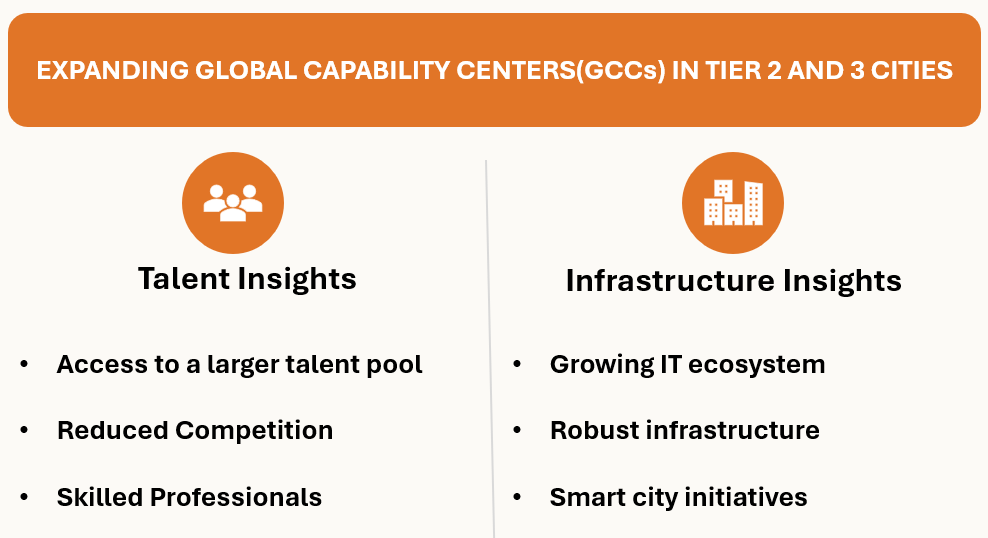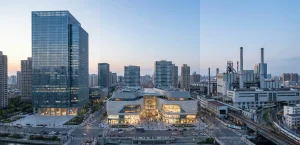Scaling GCCs in Emerging Cities
Published on
Global Capability Centers (GCCs) are entering a new phase of growth in India, with Tier-2 and Tier-3 cities emerging as pivotal destinations for GCC expansion. Traditionally concentrated in metropolitan hubs, GCCs are now being created in these smaller cities.
The new location brings about a combination of cost advantages, access to a burgeoning talent pool, and government incentives. This shift is not merely a response to the saturation of Tier 1 cities. It is a deliberate strategy to de-risk operations, diversify talent sources, and tap into new growth corridors.
Why Expand GCCs to Tier 2 and 3 Cities?
The opportunities for such expansion are compelling. These cities offer lower operating expenses and real estate costs, competitive salaries, and a growing supply of engineering and technology professionals eager to work closer to home.
The trend is evident thanks to the share of GCCs in Tier 2 and 3 cities rising from 5% in 2019 to 7% in 2024, and projections indicating continued robust growth. However, GCC expansion in such cities is not without its risks.
Some of the common challenges are:
- Betterment of infrastructure
- Deficiencies in specialized skills
- Regulatory intricacies
- Difficulties in a workplace’s cultural integration
Although numerous obstacles are being proactively tackled through both public and private investment, it is crucial to engage in strategic planning and foster local partnerships to guarantee enduring success.

Talent Insights
With as much as 60% of all of India’s technology graduates hailing from tier 2 and 3 cities, access to highly skilled talent is the biggest magnet attracting global enterprises to these cities.
- Access to a Larger Talent Pool
Tier 2 and 3 cities are rapidly evolving in terms of skilled talent for GCCs. The expansion into these cities allows companies to tap into a diverse and less saturated workforce.With the introduction of the National Framework for GCCs, India is strategically expanding its global talent to enable multinational firms to diversify and grow their pool of professionals.
- Reduced Competition
Lower competition for talent is a distinct advantage in Tier 2 and 3 cities. Unlike metros, where multiple companies vie for the same skilled professionals, these emerging hubs offer GCCs the opportunity to attract and retain talent more effectively.
- Skilled Professionals
India boasts a robust educational ecosystem, which ensures that global companies can get a steady supply of talented professionals from smaller cities. Many tier 2 and tier 3 cities have abundant colleges offering engineering, management, and technology courses. They cultivate a highly capable workforce ready to take on global roles.
This ensures a symbiotic relationship between industry and the local academia, which allows qualified individuals to get employment within their cities. This, when combined with targeted upskilling, ensures that the workforce’s proficiency and flexibility are continuously enhanced.
Infrastructure Insights
In addition to the availability of talent in smaller towns, GCC expansion here also benefits the infrastructural growth of Tier 2 and 3 cities.
- Growing IT Ecosystem
The IT ecosystem in Tier 2 and 3 cities is growing fast, driven by both public and private sector investments. These cities are seeing the emergence of technology parks, incubators, and innovation hubs that support GCCs and related industries.As a result, emerging city GCCs like Bhubaneswar, Ahmedabad, Coimbatore, and Kochi are becoming attractive destinations for technology-driven operations.
- Robust Infrastructure
Large GCCs are attracted towards tier 2 and tier 3 cities, as they see major improvements in physical and digital infrastructure. Central and state governments are directing funds to developing transport systems, building modern workspaces, and ensuring reliable connectivity to foster sustainable growth.
- Smart City Initiatives
The Indian government started the Smart City initiative to transform smaller cities and take the modern business ecosystem beyond metropolises. This focuses on developing urban infrastructure and digital services. This directly supports the needs of GCCs and their employees.
Overcoming Expansion Challenges
A multi-pronged, proactive approach that addresses both operational and strategic barriers is the only way that GCCs in emerging cities can be successful. These barriers include:
- Infrastructure Gaps
Navigating state-specific regulations and tax incentives can be challenging. Engaging with local consultants, legal advisors, and government liaison officers can help streamline compliance and maximize incentives.
- Talent and Skill Gaps
While the talent pool is expanding, there be be shortages in niche or advanced skills (e.g., AI, cybersecurity). GCCs can address this by investing in training, upskilling, and partnering with local academic institutions. Bringing in experienced professionals from Tier 1 cities for mentoring and leadership roles can also help bridge immediate gaps.
- Regulatory Complexities
Navigating state-specific regulations and tax incentives can be tricky. Working with local consultants, legal advisors, and government liaison officers can help simplify compliance and maximize incentives.
- Cultural Integration
Integrating corporate culture with local practices requires sensitivity and structured onboarding. Providing cultural sensitivity training and fostering inclusive work environments are essential for smooth integration and retention.
- Government Support
The Indian Government’s National Framework for GCCs and state-level incentives are actively addressing many of these challenges by improving infrastructure, reforming building bylaws, and promoting industry collaboration.
Top Tier 2 Cities Becoming GCC Magnets
The selection of Tier 2 and 3 cities depends on business-friendly government initiatives, presence of tech parks for access to top-notch infrastructure, and the availability of ready talent. Some preferred Tier 2 cities for GCC expansion include Coimbatore, Pune, Chennai, Jaipur, Kochi, Chandigarh and Visakhapatnam.
Emerging GCC hotspots in Tier‑II and other markets are rapidly evolving into centers for product development, AI, cybersecurity, finance, and customer experience.
Guidehouse, a healthcare, financial services and technology company has its GCC in Chennai’s Ramanujan IT City and materials handling equipment enterprise Hyster-Yale Group set up its GCC in Amboli, Pune, which focuses on engineering, supply chain and marketing initiatives.
From choosing the most strategic location to real estate, talent acquisition, and regulatory compliance, you can rely on ANSR when planning your GCC in India. Contact our team to know how we can help you scale and strengthen your business.




